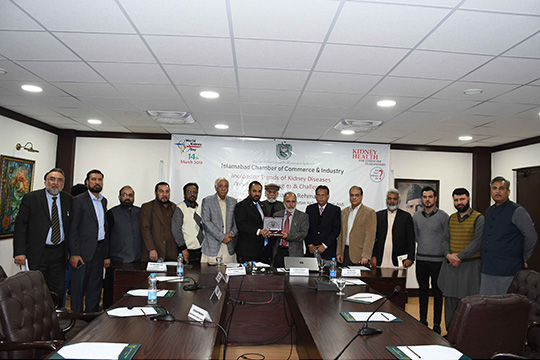Ahmed Hassan Moughal, President, Islamabad Chamber of Commerce & Industry (ICCI) has called upon the government to equip public hospitals with advanced screening technologies to diagnose and prevent kidney disease as it was emerging as a silent killer, especially for poor and low income people. He was addressing a seminar titled “Kidney Health for Everyone Everywhere” that was organized by ICCI in collaboration with Pakistan Kidney Center, Abbottabad to mark the World Kidney Day.
Ahmed Hassan Moughal said that government should take measures to provide facilities in hospitals for systematic screening of all patients with diabetes and hypertension for chronic kidney disease (CKD). He said that CKD was the 6th fastest growing cause of death while Pakistan was reportedly the eighth largest country with high prevalence of kidney disease causing 20 thousand deaths annually. This situation demanded that government should focus on preventive strategies to cope with the rising kidney disease.
Dr. Khalil ur Rehman, Nephrologist, Pakistan Kidney Center, Abbottabad gave a detailed presentation to the business community on the causes of kidney disease and its preventive measures. He said the increase in kidney disease was alarming as around 850 million people worldwide were affected with some sort of kidney diseases with around 2.4 million annual deaths. He said that CKD was a silent killer as most of the kidney was already damaged by the time the symptoms of kidney diseases appeared.
Dr. Khalil ur Rehman said swollen face and feet, tiredness, lack of appetite, lack of concentration, blood in urine, frothy urine, vomiting and difficulty in breathing were the main symptoms of kidney diseases. He said diabetes, kidney glomerular diseases and high blood pressure were the leading cause of CKD. Other causes included excessive use of drugs, quakes medicines, genetic disorders, by birth defects, stone disease, infections, environmental pollution, unhygienic conditions and older age.
Highlighting the preventive measures, he advised for low intake of salt and oily foods, staying hydrated, eating more fruits and vegetables, staying physically active, regular checkup with doctors, no consumption of alcohol and tobacco, maintaining balanced diet and weight, controlling sugar levels for diabetic patients, controlling high blood pressure in hypertensive patients and compliance with medications as directed by the physician.


